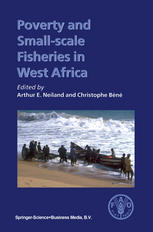

Most ebook files are in PDF format, so you can easily read them using various software such as Foxit Reader or directly on the Google Chrome browser.
Some ebook files are released by publishers in other formats such as .awz, .mobi, .epub, .fb2, etc. You may need to install specific software to read these formats on mobile/PC, such as Calibre.
Please read the tutorial at this link: https://ebookbell.com/faq
We offer FREE conversion to the popular formats you request; however, this may take some time. Therefore, right after payment, please email us, and we will try to provide the service as quickly as possible.
For some exceptional file formats or broken links (if any), please refrain from opening any disputes. Instead, email us first, and we will try to assist within a maximum of 6 hours.
EbookBell Team

4.4
82 reviewsThis book arises from case studies and two back-to-back workshops held in Cotonou, Benin in November 2001. They were the combination of much experience and knowledge gathered in the West Africa region and were brought about to explore the concept of poverty, especially how it is a part of the life of fishing communities and our ways of thinking about resolving the issue. The workshops were conceived as a partnership between the UK Department for International Development (DFID), the Food and Agriculture Organization of the United Nations (F AO) and 25 countries of West Africa, working together through the Sustainable Fisheries Livelihood Programme (SFLP) to join forces with the Centre for the Economics and Management of Aquatic Resources (CEMARE). The SFLP, with its remit of poverty alleviation in West African artisanal fisheries communities through better governance and improved policies to involve communities in management of the resources on which their livelihoods depend, had quickly realised that it needed to define what and whom it was targeting. In this respect, the two large back-to-back workshops marked a milestone for the SFLP. Those participating in the workshop soon emphasised that we need to push forward our ideas from the previous simplistic "less than a dollar a day" type definitions to show that poverty is multi-faceted and a dynamic feature of human society.